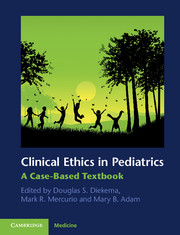Book contents
- Frontmatter
- Contents
- Contributors
- Preface
- Section 1 Core issues in clinical pediatric ethics
- Section 2 Ethical issues at the beginning of life: perinatology and neonatology
- Section 3 When a child dies: ethical issues at the end of life
- Section 4 Ethical issues posed by advances in medical technology and science
- 25 Minors as recipients and donors in solid organ transplantation
- 26 Enhancement technologies and children
- 27 Cochlear implants and deaf children
- 28 Ethical issues in the treatment of pediatric patients with disorders of sex development
- 29 Sterilizing procedures in minors with cognitive disabilities
- 30 Parental requests for intervention in children with lethal conditions
- 31 Genetic testing and screening of minors
- 32 The introduction of innovative technology into practice
- 33 Human subjects research involving children
- Section 5 Children, public health, and justice
- Section 6 Special topics in pediatric ethics
- Index
- References
27 - Cochlear implants and deaf children
from Section 4 - Ethical issues posed by advances in medical technology and science
Published online by Cambridge University Press: 07 October 2011
- Frontmatter
- Contents
- Contributors
- Preface
- Section 1 Core issues in clinical pediatric ethics
- Section 2 Ethical issues at the beginning of life: perinatology and neonatology
- Section 3 When a child dies: ethical issues at the end of life
- Section 4 Ethical issues posed by advances in medical technology and science
- 25 Minors as recipients and donors in solid organ transplantation
- 26 Enhancement technologies and children
- 27 Cochlear implants and deaf children
- 28 Ethical issues in the treatment of pediatric patients with disorders of sex development
- 29 Sterilizing procedures in minors with cognitive disabilities
- 30 Parental requests for intervention in children with lethal conditions
- 31 Genetic testing and screening of minors
- 32 The introduction of innovative technology into practice
- 33 Human subjects research involving children
- Section 5 Children, public health, and justice
- Section 6 Special topics in pediatric ethics
- Index
- References
Summary
Case narrative
After an uneventful pregnancy, a woman delivers a healthy baby boy. Prior to discharge from the hospital, the infant undergoes newborn screening and is found to be prelingually deaf with complete sensorineural hearing loss. The family is referred to an audiologist who recommends a cochlear implant for the child. He is physically an ideal candidate and an implant would give him the best chance at spoken communication.
The parents, who are both culturally Deaf, oppose the cochlear implant. They view his deafness as a part of who he is rather than as a deficit or a disability requiring medical intervention. They desire for their son to fully share in their family’s culture and communicate fluently with them in ASL, their native language. They worry that an implant could potentially inhibit his full participation in their community. They also express fears that an implant would signal to their child and society that something was wrong with him by viewing his deafness as pathological rather than an integral piece of his identity.
- Type
- Chapter
- Information
- Clinical Ethics in PediatricsA Case-Based Textbook, pp. 154 - 159Publisher: Cambridge University PressPrint publication year: 2011
References
- 1
- Cited by



